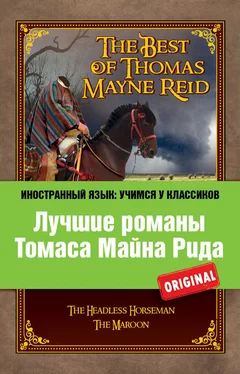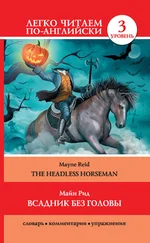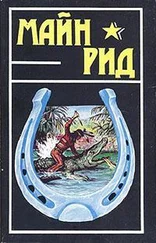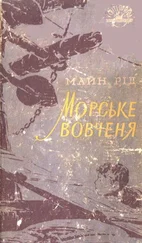“Who can he be?” inquired one of two gentle gossips within earshot of Kate.
“A young Englishman, I have heard: a relative of Vaughans of Mount Welcome; though, for some reason, not acknowledged by the Custos.”
“That bold girl appears willing enough to acknowledge him. Who is she?”
“A Miss Jessuron. She is the daughter of the old Jew penn-keeper, who used to deal largely in blacks.”
“Faugh! she is behaving as if she belonged to a – ”
The last word was whispered, and Kate did not hear it.
“True enough!” asserted the other; “but, as they are engaged, that, I take it, is nobody’s business but their own. He’s a stranger in the Island; and don’t know much about certain people’s position, I suppose. A pity! He seems a nice sort of a young fellow; but as he makes his bed, so let him lie. Ha! ha! If report speaks true of Miss Judith Jessuron, he’ll find no bed of roses there. Ha! ha! ha!”
What causes merriment to one may make another miserable. This was true of the words last spoken. From the speaker and her companion they elicited a laugh – from Kate Vaughan they drew a sigh, deep and sad.
She left the ball with a bleeding heart.
“Lost! lost for ever!” murmured she, as she laid her cheek upon a sleepless pillow.
“Won!” triumphantly exclaimed Judith Jessuron, flinging her majestic form on a couch. “Herbert Vaughan is mine!”
“Lost! lost for ever!” soliloquised Herbert, as he closed the door of his solitary sleeping-room.
“Won!” cried the victorious Smythje, entering his elegant bed-chamber, and, in the fervour of his enthusiasm, dropping his metropolitan patois . “Kate Vaughan is mine!”
Chapter 17
After the Ball
The time was rapidly drawing nigh when the ambitious scheme of the Custos Vaughan was either to be crowned with success, or end in failure.
Of the latter he had little apprehension. Though Smythje, having lost the opportunity of the eclipse, had not yet declared himself, Mr Vaughan knew it was his intention to do so on an early occasion. Indeed, the declaration was only postponed by the advice of the Custos himself, whose counsel had been sought by his intended son-in-law.
Not that Mr Vaughan had any fear of Kate’s giving a negative answer. The stern father knew that he had his daughter too well in hand for that. His wish would be her will – on that point was he determined; and it was less the fear of a refusal than some other circumstances that had hindered him from bringing the matter earlier to a crisis.
As for Smythje, he never dreamt of a rejection. Kate’s behaviour at the ball had confirmed him in the belief that she was entirely his own; and that without him her future existence would be one of misery. Her pale cheek, and sad, thoughtful air, as she appeared next morning at the breakfast-table, told him too plainly that she would never be happy under any other name than that of Mrs Smythje.
Again, upon that morning, it occurred to him that the proposal should be made. It would be an appropriate finale to the fête of the preceding night.
His brow still glowing with the laurels that had bedecked it, like a second Antony [531] he would approach his Cleopatra [532] , triumphantly irresistible.
After breakfast, Mr Smythje drew the Custos into a corner, and once more expressed his solicitude to become his son-in-law.
Whether, because Kate’s behaviour at the ball had also impressed Mr Vaughan with the appropriateness of the time, or for some other reason, Smythje found him agreeable. Only first, the father desired to have a few words with his daughter, in order to prepare her for the distinguished honour of which she was so soon to be the recipient.
Kate had gone out into the kiosk. There Mr Vaughan sought her, to bring about the proposed preliminary interview. Smythje also stepped into the garden; but, instead of going near the summer-house, he sauntered along the walks at a distance, occasionally plucking a flower, or chasing the butterflies, bright and gay as his own thoughts.
Kate’s countenance still preserved the air of melancholy that had clouded it all the morning; and the approach of the Custos did nothing to dissipate it. On the contrary, its shadows became deeper, as if the ponderous presence of her father, coming between her and the sun, was about to shut out the little light left shining in her heart.
From what she had heard that morning, she presumed that the time had arrived when she must either submit to the wishes of her father, and resign herself to an unhappy fate; or, by disobedience, brave his anger, and perhaps – she knew not what.
She only knew that she did not like Mr Smythje, and never could. She did not hate the man – she did not detest him. Her feeling towards him was that of indifference, slightly tinctured with contempt. Harmless she deemed him; and, no doubt, a harmless husband he would make; but that was not the sort to suit the taste of the young Creole. Far different was the hero of her heart.
Neither the lover nor his prospective father-in-law could have chosen a time more opportune for making their approaches. Although at that time Kate Vaughan felt towards Smythje more indifference – perhaps more contempt – than she had ever done, at that very hour was she wavering in the intention, hitherto cherished, of refusing him.
Though both lover and father had erroneously interpreted her air of dejection, it was nevertheless in their favour. It was not love for Smythje under which she was suffering; but despair of this passion for another; and in that despair lay the hope – the only hope – of the lord of Montagu Castle.
It was a despair not unmingled with pique – with anger; that proud rage, which painfully wringing the heart, prompts it to desperate resolves: even to the utter annihilation of all future hope – as if happiness could be obtained by destroying the happiness of the one only being who could give it!
Yes, the heart of Kate Vaughan had reached, or almost reached, that fearful phase of our moral nature, when love, convinced of its unrequital, seeks solace in revenge!
The Smythje ball, which had crowned the hopes of him to whom the compliment was given, had been fatal to those of Kate Vaughan.
Certain it was that she had conceived hopes that pointed to Herbert Vaughan. Love could scarce have been kindled without them. They were founded upon those fond words spoken at their first parting. Slight as was the foundation, up to that night had they endured: for she had treasured and cherished them in spite of absence, and calumny, and false report.
True, as time passed they had waxed fainter, with longer intervals of doubt, until the day in which had occurred the unexpected incident of their meeting upon the Jumbé Rock.
Then they had become revived, and since then they had lived with more or less intermission until that fatal night – the night of the Smythje ball – when they were doomed to utter extinction.
All night long he had come but once near her – only that once by the mere chance of changing positions. And that bow – that single salutation, friendly as it might have been deemed, she could only remember as being cold – almost cynical!
She did not think how cold and distant had been her own – at least, how much so it must have appeared to him. Though her eyes had often sought him in the crowd, and often found him, she did not know that his were equally following her, and equally as often fixed upon her. Both were ignorant of this mutual espionage: for each had studiously declined responding to the glance of the other.
Never more that night had he come near – never again had he shown a desire or made an attempt to address her; though opportunities there were – many – when no paternal eye was upon her to prevent an interview.
Читать дальше
Конец ознакомительного отрывка
Купить книгу











